|
|
|
Sort Order |
|
|
|
Items / Page
|
|
|
|
|
|
|
| Srl | Item |
| 1 |
ID:
141170
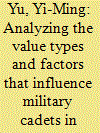

|
|
|
|
|
| Summary/Abstract |
Previous studies have unanimously agreed that despite the challenges of postmodernism, militaries should not and cannot be governed using an occupational model. However, what the notion of the value type of a postmodern army is should be clarified. This study investigates the changing values of postmodern militaries caused by external economic factors. For this research, a questionnaire and long-term investigation method were adopted to collect 262 cadet samples from the Taiwanese military, navy, and air force. The results of a cluster analysis showed that the cadets primarily comprised 3 types, that is, the devotion (DE) type, socially competent (SC) type, and the comfortable (CO) type. This study shows that the socially competent type best satisfies the value demands of the military. In addition, the enlistment motivations of this type of cadet are generally to alleviate family financial burdens, non-economic-related reasons, self-actualization, and patriotism.
|
|
|
|
|
|
|
|
|
|
|
|
|
|
|
|
| 2 |
ID:
141169
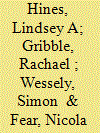

|
|
|
|
|
| Summary/Abstract |
Despite the importance of public opinion in supporting the military and their missions, little is known about how the UK public perceive their Armed Forces. This article reviews and evaluates available research and opinion poll data of public attitudes toward the UK military and situates the evidence within the civil–military gap literature. Current evidence suggests public regard for the UK Armed Forces is high despite low levels of support for the Iraq and Afghanistan missions. Public understanding of the work of the Armed Forces is limited. Nonetheless, the United Kingdom’s long history of military deployments may have given the public an “intuitive understanding” of the basic realities of the military compared with other European states. There are indications of differences in attitudes between the UK Armed Forces and wider British society, but no firm evidence that the civil–military “gap” has become a “gulf” as claimed by some military leaders.
|
|
|
|
|
|
|
|
|
|
|
|
|
|
|
|
| 3 |
ID:
141172
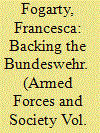

|
|
|
|
|
| Summary/Abstract |
Along with Germany’s suspension of the Wehrpflicht (mandatory service requirement) in 2011, the Bundeswehr has been reformed to accommodate an all-volunteer force. In the years that followed, studies were conducted to determine the state of civil–military relations in Germany via the opinions of military leadership regarding the reforms and via the opinions of civilians on their perspective of the military in general. This study provides additional data from the perspective of young soldiers (n = 347) at the Universität der Bundeswehr München and the Helmut Schmidt Universität in Hamburg regarding the civil–military relationship in Germany as of early 2014. The results indicate that the majority of these young soldiers are satisfied with their decision to join the Bundeswehr, yet they feel unsupported and underappreciated by the society they serve.
|
|
|
|
|
|
|
|
|
|
|
|
|
|
|
|
| 4 |
ID:
141166
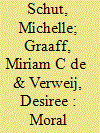

|
|
|
|
|
| Summary/Abstract |
Which emotions are generated by the behavior of “the other” in intercultural interactions that Dutch soldiers perceive as conflicting with their own values? How are these emotions related to types of behavioral reactions of Dutch military personnel? This preliminary study explores the emotional and behavioral reactions of Dutch military personnel deployed in unfamiliar cultural settings. Using a grounded theory approach, a total of 121 situations were studied. The narratives were derived from interview sessions with servicemen reflecting on their recent deployment. The results of this explorative study indicate that violations of standards with regard to an individual’s position in society evoke most emotions. The more a situation is experienced as reprehensible and “strange,” the stronger the negative emotions. Although most soldiers did not react in accordance with their strong and negative emotions (they started a dialogue or reported the incident), the consequences of such emotions and subsequent reactions can have quite an impact on the individual level as well as on the organizational and international political level. We therefore underline the importance of combining ethical dilemma and cultural awareness training during predeployment.
|
|
|
|
|
|
|
|
|
|
|
|
|
|
|
|
| 5 |
ID:
141168
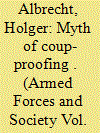

|
|
|
|
|
| Summary/Abstract |
This article argues that coup-proofing does not necessarily reduce the general propensity among military officers to stage coups d’état against authoritarian incumbents. Sophisticated coup-proofing terminates coup cascades and buys incumbent rulers time in office, but general coup risk remains high even if they maintain power for long periods of time. The article uses a new data set on coups in the Middle East and North Africa covering the period 1950–2013. The data reveal that the number of coup instances has decreased over time, but the risk for incumbents of falling to a coup during their extended time in office remains constant, even in coup-proofed autocracies. When autocrats apply coup-proofing measures, timing and agency become increasingly important. Plotters attempt coups either immediately after power turnovers or when incumbents turn into lame ducks after excessively long periods of rule. Success rates increase when coup plotters are supported by central military leaderships.
|
|
|
|
|
|
|
|
|
|
|
|
|
|
|
|
| 6 |
ID:
141171
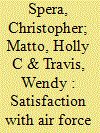

|
|
|
|
|
| Summary/Abstract |
This study examined whether satisfaction with the Air Force (AF) as way of life increased post-9/11 and whether it has sustained. Using data from 179,309 personnel collected across a period of eight years (2000–2008) in four waves of cross-sectional data collection, we found that satisfaction with the AF as a way of life increased dramatically following 9/11 and since then has declined from the height, but has not returned to pre-9/11 levels. After controlling for time as well as demographics, the best predictors of satisfaction were (1) feeling that the AF is a good environment for bringing up children, (2) a strong a sense of community, and (3) perceived strong unit leader support for members and their families.
|
|
|
|
|
|
|
|
|
|
|
|
|
|
|
|
| 7 |
ID:
141167


|
|
|
|
|
| Summary/Abstract |
The theoretical discourse in civil–military relations tends to perpetuate the notion that efficiency of military organizations is often negatively affected by the influence of domestic ideological factors. Societal norms are frequently portrayed as antithetical to the functional imperatives of the military. This article questions this notion and argues that an effective form of military organization can be produced by incorporating ethical norms of domestic society into its defense organization. To understand the role of societal ethical imperatives in defense policy, the Kantian model of societal–military relations is introduced here. This model emphasizes the normative character of military missions and suggests that its effective fulfillment requires an institutional culture consistent with such a mission. This is demonstrated in the case studies of West German rearmament and the post–Cold War transformation of the Bundeswehr. These empirical cases demonstrate that the societal ethical norms should be considered integral to military functional requirements.
|
|
|
|
|
|
|
|
|
|
|
|
|
|
|
|
|
|
|
|
|